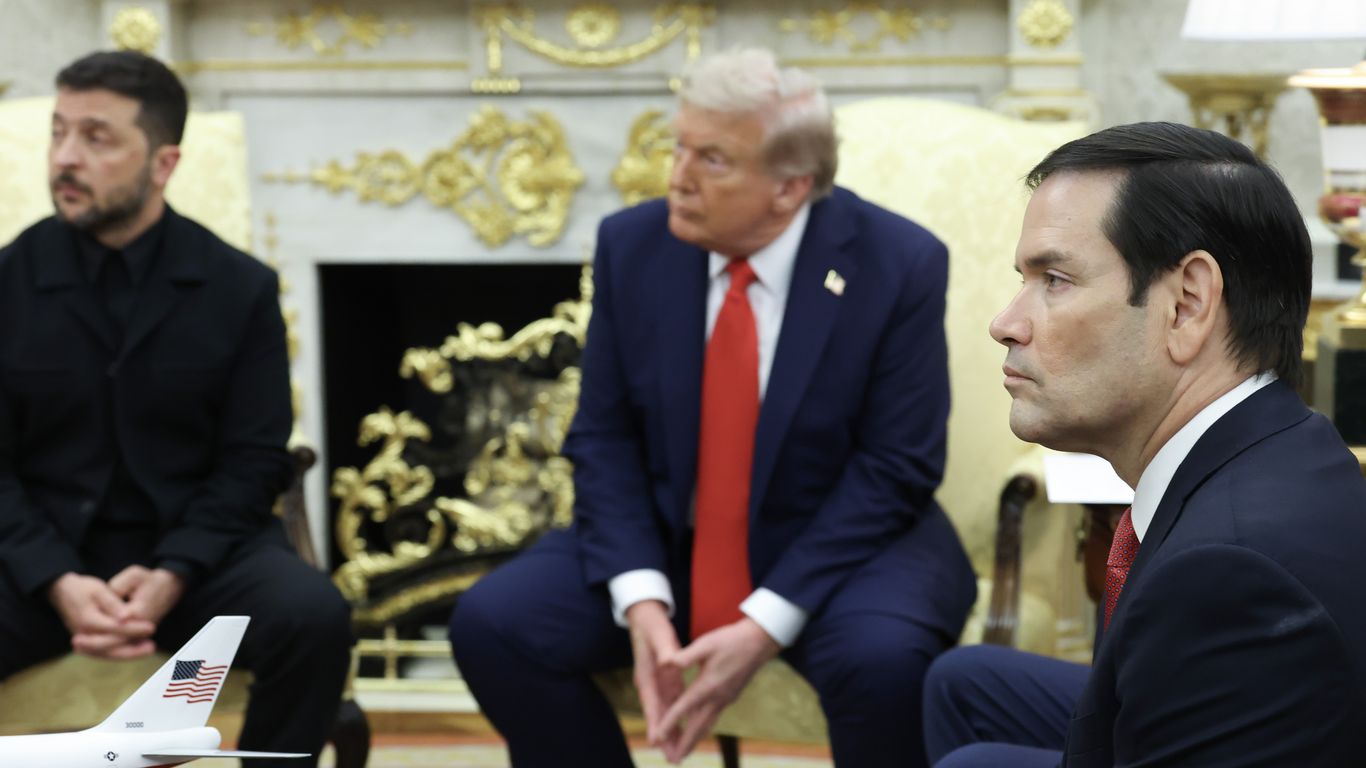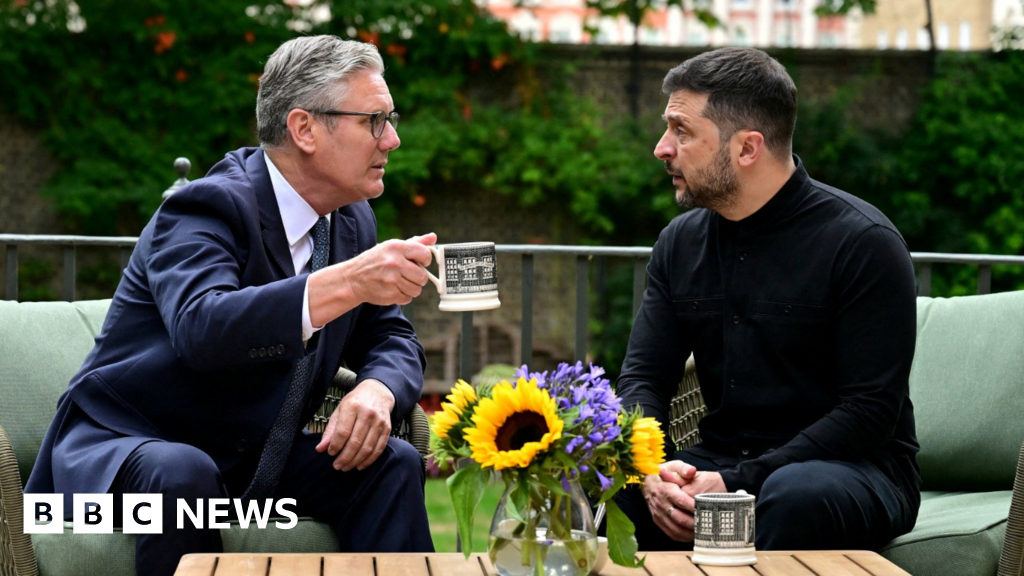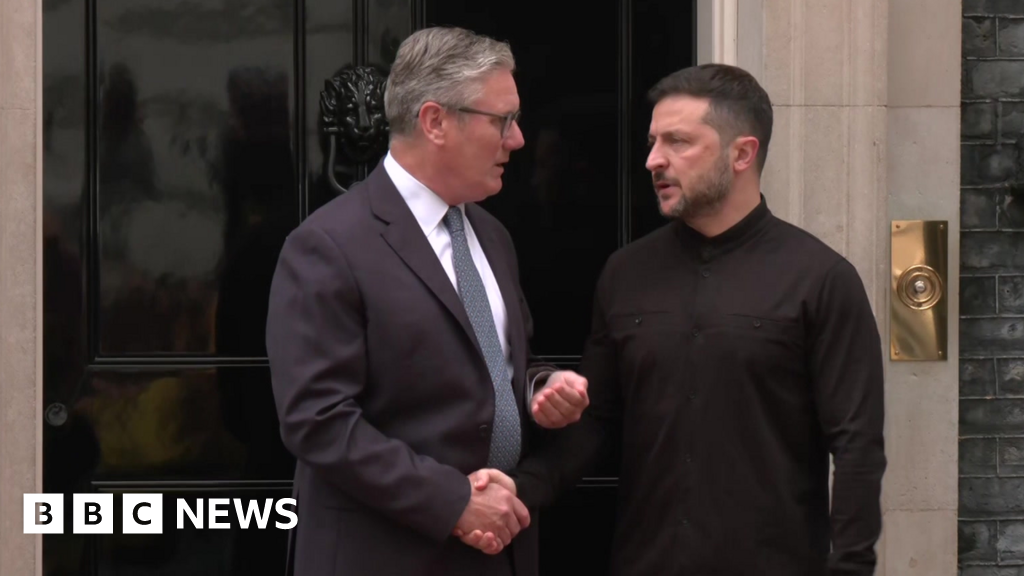Tensions High as US and Russia Discuss War in Ukraine

Introduction
Tensions between the US and Russia have been high as President Trump and President Putin discuss the ongoing war in Ukraine. Despite the recent talks between Putin and Ukrainian President Zelensky, the Kremlin has downplayed the possibility of a deal being made. Trump has also warned that Putin may not be willing to negotiate. The situation is complex and difficult to resolve, as evidenced by the multiple days of high-level discussions.
Key Details
The war in Ukraine has been ongoing since 2014, when Russian-backed separatists seized control of the Crimean peninsula. Although there have been multiple attempts at peace talks, the conflict has continued to escalate. The recent talks between Zelensky and Putin were seen as a potential breakthrough, but it seems that the Kremlin may not be as optimistic as the US. This is not the first time that Trump has expressed concern about Putin's intentions, as tensions between the two countries have been on the rise.
Impact
The outcome of these talks could have major implications for the ongoing conflict in Ukraine and the relationship between the US and Russia. As a top SEO blogger, it's important to stay updated on current events and provide valuable insights for readers. It's clear that the situation is complex and may take more time to find a resolution. As for now, we can only wait and see what will come out of the talks
About the People Mentioned
Donald Trump
Donald John Trump, born June 14, 1946, in Queens, New York, is an American businessman, media personality, and politician. He graduated from the University of Pennsylvania’s Wharton School in 1968 with a degree in economics. In 1971, he took over his family’s real estate business, renaming it the Trump Organization, through which he expanded into building and managing skyscrapers, hotels, casinos, and golf courses. Trump gained widespread fame as the host of the reality TV show *The Apprentice* from 2004 to 2015, which helped establish his public persona as a successful entrepreneur. Trump entered politics as a Republican and was elected the 45th president of the United States, serving from 2017 to 2021. His presidency was marked by significant policy actions including tax cuts, deregulation, the appointment of three Supreme Court justices, renegotiation of trade agreements (notably replacing NAFTA with the USMCA), and a focus on immigration control including border wall expansion. He withdrew the U.S. from international agreements such as the Paris Climate Accord and the Iran nuclear deal, and engaged in a trade war with China. His administration’s response to the COVID-19 pandemic was criticized for downplaying the virus’s severity. Trump was impeached twice by the House of Representatives—first in 2019 for abuse of power and obstruction, and again in 2021 for incitement of insurrection—but was acquitted by the Senate both times. After losing the 2020 election to Joe Biden, Trump challenged the results, culminating in the January 6, 2021, Capitol riot. He remains a central figure in American politics, having won the 2024 presidential election and returned as the 47th president in 2025, continuing to promote policies aimed at economic growth, border security, and military strength[1][2][3][4].
Vladimir Putin
Vladimir Putin is the current President of Russia, a position he has held for multiple terms since 2000, with a brief interlude as Prime Minister from 2008 to 2012[1][3]. Born in Leningrad (now Saint Petersburg) in 1952, Putin began his career in the Soviet Union’s security services, joining the KGB in 1975 and rising to the rank of Lieutenant Colonel by the time he left in 1991, following postings in East Germany and Leningrad[4]. After the Soviet Union’s collapse, he transitioned into politics, serving as an adviser to Saint Petersburg Mayor Anatoly Sobchak and later moving to Moscow, where he held various administrative roles under President Boris Yeltsin[6]. Putin was appointed Prime Minister in August 1999 and became acting President when Yeltsin unexpectedly resigned that December[3][6]. He won his first presidential election in March 2000, promising to stabilize Russia’s economy and political system after the tumultuous 1990s[3][7]. During his initial terms, he centralized power, reasserted federal control over Russia’s regions, and curtailed the influence of the country’s oligarchs through legal and economic measures[7]. Putin was re-elected in 2004 but, due to constitutional term limits, stepped aside in 2008, becoming Prime Minister under his successor Dmitry Medvedev, while retaining significant influence[3]. Constitutional amendments later extended presidential terms, and Putin returned to the presidency in 2012[1]. Putin’s time in office has been marked by assertive foreign policy, including military interventions in Syria in support of President Bashar al-Assad and the 2014 annexation of Crimea, which led to international sanctions[1]. Domestically, his tenure has seen increased state control over media, the suppression of political opposition, and constitutional changes consolidating executive authority[1]. In 2022, Russia’s full-scale invasion of Ukraine triggered a major international crisis, further isolating Russia from the West and prompting widespread condemnation[1]. As of 2025, Putin remains a dominant figure in Russian politics, having secured another term in office through constitutional changes that allow him to potentially remain president until 2036[1]. His leadership continues to shape Russia’s domestic trajectory and its role in global affairs, amid ongoing conflict in Ukraine and strained relations with NATO and Western countries[1].
Volodymyr Zelensky
Volodymyr Zelensky is a Ukrainian politician and former comedian who was born on January 25, 1978, in Kryvyi Rih, Ukraine. Prior to his political career, he gained fame as an actor and comedian, notably for his role in the TV series "Servant of the People," where he portrayed a teacher who becomes president. This role ironically foreshadowed his future as the sixth president of Ukraine, a position he assumed on May 20, 2019, after winning the presidential election on April 21, 2019[1][2][4]. Zelensky's presidency has been marked by significant challenges, including the COVID-19 pandemic and escalating tensions with Russia. His leadership during these crises has been notable, particularly his response to the Russian invasion of Ukraine in February 2022. He became an international symbol of resistance, refusing evacuation offers and rallying global support for Ukraine. Under his leadership, Ukraine has received substantial international military and financial aid[1][3]. One of Zelensky's key achievements is his ability to unite Ukrainians and communicate effectively with the international community. His presidency has been recognized globally, with Time Magazine naming him Person of the Year in 2022 for his leadership during the Russian invasion[1][3]. Despite lacking prior political experience, Zelensky has demonstrated resilience and strategic communication skills, which have been crucial in navigating Ukraine through its most challenging moments. Currently, Zelensky remains a central figure in international politics, especially in the context of the ongoing conflict with Russia. His commitment to defending Ukraine's sovereignty has garnered widespread support, both domestically and internationally. Zelensky is married to Olena Zelenska and has two children, balancing his public duties with family life[1][4].
About the Organizations Mentioned
Kremlin
The term "Kremlin" primarily refers to the executive branch and central administration of the Russian government, symbolized by the Moscow Kremlin complex. It represents the seat of political power in Russia, particularly under President Vladimir Putin's leadership. The Kremlin as an organization orchestrates Russia's domestic and foreign policy, including its strategic approach to technology and cybersecurity. Historically, after the Soviet Union's collapse in 1991, Russia's digital and technological sectors were initially intertwined with the West, benefiting from collaborations and outsourcing opportunities. However, since the late 2000s and early 2010s, the Kremlin shifted toward digital tech isolationism driven by concerns over regime security and foreign influence. This shift intensified after Russia's 2022 full-scale invasion of Ukraine, leading to heightened securitization, sanctions, and a push for domestic alternatives to Western technology[1][2]. The Kremlin aggressively promotes the development of indigenous digital technologies, including microelectronics, software, and cybersecurity platforms, aiming to reduce reliance on foreign tech companies. This strategy is framed as both a security necessity and a geopolitical move to maintain Russia's status as a great power in an era of global technological competition[3]. Despite sanctions targeting key Russian IT companies and a brain drain of skilled professionals, Kremlin-backed narratives assert resilience and a vision to build a techno-economic bloc with its allies[2]. Notably, President Putin has emphasized the need to "strangle" Western technology companies still operating in Russia, seeking to eliminate their presence to foster domestic alternatives and counter perceived threats[5]. The Kremlin also leverages cyber capabilities through state agencies like the FSB and SVR, integrating cyber operations into its broader security and intelligence framework[9]. Currently, the Kremlin faces challenges such as talent outflow and innovation constraints but continues prioritizing technological sovereignty and cyber power as essential to its regime stability and geopolitical ambitions[2][7]. The Kremlin's tech policies remain a critical facet of its governance, blending business, technology, and securit



















